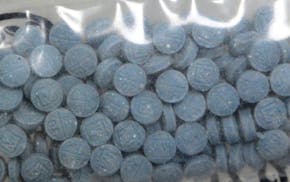Abbey Fleck was only 8 years old in 1993 when she came up with the idea for a piece of microwave cookware for making bacon that her father, Jon, turned into a multimillion-dollar business.
Last week, Fleck, now 33, and still a partner with her father in a business that produces Makin Bacon-branded cooking trays, said the business is threatened by online peddlers such as China's Alibaba Group and eBay that they say allow counterfeiters to sell on their websites.
Fleck said she is tired of seeing knockoff products in boxes that feature her photo and the trademarked name of her product that contain mostly plastic junk that melts in a microwave oven.
"A lot of counterfeiting is happening internationally," Fleck said. "It used to be one person would counterfeit and you'd go after him. Now, you get lawyers and it's like playing virtual Whac-A-Mole. Thanks to Alibaba and eBay and Amazon, the counterfeiters have anonymity. They sometimes cut off some sellers from their websites, and they will pop up the next day with a different name selling the same product.
"The counterfeiters sell an inferior, dangerous product that melts in the microwave into molten grease. And it has my name and face on that product. At this point, our company is in danger."
This small business, which manufactures through a contract factory in St. Croix Falls, Wis., has hired a San Francisco-based intellectual property law firm to tell Alibaba, eBay and Amazon to better police their websites.
Only Amazon is working with the company, said Jeff Rosenfeld, Fleck's attorney. Makin Bacon notifies Amazon when it spots an impostor firm and Amazon checks to assure that the impostor is posing as Makin Bacon through its company-identification system.
"Amazon has a system that links an identifying number that refers to a specific product on Amazon," said Rosenfeld, which allows Amazon to kick off the impostor product.
Alibaba said in a written statement that it has addressed Makin Bacon's concerns on its main website, and removed the counterfeit listing in February. Rosenfeld said the bigger problem is one of Alibaba's other websites, 1688.com.
"Alibaba takes IP protection very seriously," the company said in a statement. "Where a company demonstrates their ownership of IP, we take swift action against its infringers. In Makin Bacon's case, we removed within days the listing on our international wholesale marketplace Alibaba.com as requested based on an evidence-established trademark violation. Since 1688.com is a China wholesale marketplace … as a third-party marketplace we are not in the position to enforce their IP since it has not been registered with the China Trademark Office.
"We welcome Makin Bacon … to continue to work with us to protect their IP on our platforms. We also encourage innovators to register their IP in China as quickly as possible as we are bound by the laws of the countries in which we operate."
The Flecks, who also sell through Wal-Mart and Target, said the surge in online counterfeits threatens to bankrupt the business. Abbey Fleck deferred to her father, who declined to quantify company sales and how much the business is off due to knockoffs.
Million-dollar idea
Jon Fleck was cooking bacon one weekend in 1993 and ran out of paper towels to sop up the grease that had accumulated on the plate holding the meat. Abbey, then 8, looked up from her perch at the kitchen table and offered her million-dollar brainstorm.
"You need to hang it up while it's cooking, with a dish underneath to catch the fat," she said.
They developed the prototype that featured a built-in handle and three tiny holes into which T-shaped hangers can be inserted for cooking, above a plastic tray. The ensuing success of the then-$7 product has long attracted knockoffs.
The most serious challenge came in 1995 when a Pennsylvania firm introduced a replica of the Makin Bacon dish.
The Flecks sued and won a $150,000 settlement that included acknowledgment of their patent rights.

The head of Mexico's detective service says his country is the 'champion' of fentanyl production
Phish fans are famously dedicated. What happens when they enter the Sphere?
Cyberattacks are on the rise, and that includes small businesses. Here's what to know

Icehouse on Eat Street in Mpls. facing eviction for unpaid rent
